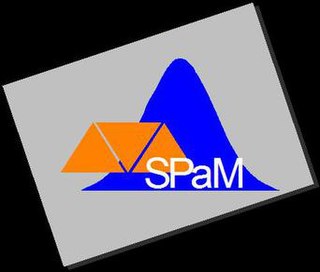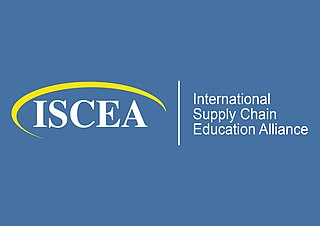Professional certification, trade certification, or professional designation, often called simply certification or qualification, is a designation earned by a person to assure qualification to perform a job or task. Not all certifications that use post-nominal letters are an acknowledgement of educational achievement, or an agency appointed to safeguard the public interest.

In commerce, supply chain management (SCM) deals with a system of procurement, operations management, logistics and marketing channels, through which raw materials can be developed into finished products and delivered to their end customers. A more narrow definition of supply chain management is the "design, planning, execution, control, and monitoring of supply chain activities with the objective of creating net value, building a competitive infrastructure, leveraging worldwide logistics, synchronising supply with demand and measuring performance globally". This can include the movement and storage of raw materials, work-in-process inventory, finished goods, and end to end order fulfilment from the point of origin to the point of consumption. Interconnected, interrelated or interlinked networks, channels and node businesses combine in the provision of products and services required by end customers in a supply chain.
Institute for Supply Management (ISM) is the world's oldest and largest supply management association. Founded in 1915, the U.S.-based not-for-profit educational association serves professionals and organizations with interest in supply management, providing education, training, qualifications, publications, information, and research.

Logistics is the part of supply chain management that deals with the efficient forward and reverse flow of goods, services, and related information from the point of origin to the point of consumption according to the needs of customers. Logistics management is a component that holds the supply chain together. The resources managed in logistics may include tangible goods such as materials, equipment, and supplies, as well as food and other consumable items.

A supply chain is a complex logistics system that consists of facilities that convert raw materials into finished products and distribute them to end consumers or end customers. Meanwhile, supply chain management deals with the flow of goods in distribution channels within the supply chain in the most efficient manner.
A value chain is a progression of activities that a business or firm performs in order to deliver goods and services of value to an end customer. The concept comes from the field of business management and was first described by Michael Porter in his 1985 best-seller, Competitive Advantage: Creating and Sustaining Superior Performance.
The idea of [Porter's Value Chain] is based on the process view of organizations, the idea of seeing a manufacturing organization as a system, made up of subsystems each with inputs, transformation processes and outputs. Inputs, transformation processes, and outputs involve the acquisition and consumption of resources – money, labour, materials, equipment, buildings, land, administration and management. How value chain activities are carried out determines costs and affects profits.

Demand-chain management (DCM) is the management of relationships between suppliers and customers to deliver the best value to the customer at the least cost to the demand chain as a whole. Demand-chain management is similar to supply-chain management but with special regard to the customers.
IATF 16949:2016 is a technical specification aimed at the development of a quality management system which provides for continual improvement, emphasizing defect prevention and the reduction of variation and waste in the automotive industry supply chain and assembly process. It is based on the ISO 9001 standard and the first edition was published in June 1999 as ISO/TS 16949:1999. IATF 16949:2016 replaced ISO/TS 16949 in October 2016.
PRTM is a management consulting subsidiary of PwC. The firm's business centers on the areas of operational strategy, supply chain innovation, product innovation, and customer experience innovation.
Materials management is a core supply chain function and includes supply chain planning and supply chain execution capabilities. Specifically, materials management is the capability firms use to plan total material requirements. The material requirements are communicated to procurement and other functions for sourcing. Materials management is also responsible for determining the amount of material to be deployed at each stocking location across the supply chain, establishing material replenishment plans, determining inventory levels to hold for each type of inventory, and communicating information regarding material needs throughout the extended supply chain.
The Supply Chain Operations Reference (SCOR) model is a process reference model originally developed and endorsed by the Supply Chain Council, now a part of ASCM, as the cross-industry, standard diagnostic tool for supply chain management. The SCOR model describes the business activities associated with satisfying a customer's demand, which include plan, source, make, deliver, return, and enable. Use of the model includes analyzing the current state of a company's processes and goals, quantifying operational performance, and comparing company performance to benchmark data. SCOR has developed a set of metrics for supply chain performance, and ASCM members have formed industry groups to collect best practices information that companies can use to elevate their supply chain models.

Sales and operations planning (S&OP) is an integrated business management process through which the executive/leadership team continually achieves focus, alignment, and synchronization among all organization functions. The S&OP process includes an updated forecast that leads to a sales plan, production plan, inventory plan, customer lead time (backlog) plan, new product development plan, strategic initiative plan, and resulting financial plan. Plan frequency and planning horizon depend on the specifics of the context. Short product life cycles and high demand volatility require a tighter S&OP than steadily consumed products. Done well, the S&OP process also enables effective supply chain management.

HP SPaM is an internal consulting group that supports HP businesses on mission-critical strategic and operation decisions. As evidenced by its publications and awards, SPaM has been a prominent example of the deployment and practice of OR/MS in large companies. Together with HP Labs, SPaM represents HP at the INFORMS Roundtable, a group of organizations whose purpose is to promote OR/MS excellence in practice.
The Automotive Industry Action Group (AIAG) is a not-for-profit association founded in 1982 and based in Southfield, Michigan. It was originally created to develop recommendations and a framework for the improvement of quality in the North American automotive industry. The association's areas of interest have expanded to include product quality standards, bar code and RFID standards, materials management, EDI, returnable containers and packaging systems, and regulatory and customs issues.
James E. Hurley was appointed to be the chief financial officer of Britannica.com Inc. on 10 November 1999.
Delivery reliability is one of the five attributes in supply-chain management according to SCOR-model, developed by the management consulting firm PRTM, now part of PricewaterhouseCoopers LLP (PwC) and endorsed by the Supply-Chain Council (SCC) as the cross-industry de facto standard diagnostic tool for supply chain management, SCOR measures the supplier’s ability to predictably complete processes as promised. It is measured by perfect order fulfillment and demonstrates the degree to which a supplier is able to serve its customers within the promised delivery time.
Management accounting in supply chains is part of the supply chain management concept. This necessitates planning, monitoring, management and information about logistics and manufacturing processes throughout the value chain. The goal of management accounting in supply chains is to optimise these processes. This strategy focuses on supporting management.
Industrial and production engineering (IPE) is an interdisciplinary engineering discipline that includes manufacturing technology, engineering sciences, management science, and optimization of complex processes, systems, or organizations. It is concerned with the understanding and application of engineering procedures in manufacturing processes and production methods. Industrial engineering dates back all the way to the industrial revolution, initiated in 1700s by Sir Adam Smith, Henry Ford, Eli Whitney, Frank Gilbreth and Lilian Gilbreth, Henry Gantt, F.W. Taylor, etc. After the 1970s, industrial and production engineering developed worldwide and started to widely use automation and robotics. Industrial and production engineering includes three areas: Mechanical engineering, industrial engineering, and management science.

Dr. Erick Christopher Jones Sr. is an industrial engineer and professor at the University of Nevada at Reno. He is an expert in radio-frequency identification (RFID), quality engineering, and Lean Six Sigma. Jones was the program director of The National Science Foundation's (NSF) Engineering Research Centers. He is currently Chair of the Supply Chain Technology Committee of International Supply Chain Education Alliance's (ISCEA) International Standards Board (IISB) and Editor in Chief of the International Supply Chain Technology Journal (ISCTJ).

The International Supply Chain Education Alliance (ISCEA) is a certifying body. Founded in 2003 and currently holding over 100,000 members, ISCEA has its World HQ office in Beachwood, OH, USA and regional offices in LATAM, EMEA and APAC. ISCEA is the governing body for the Ptak Prize.







